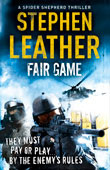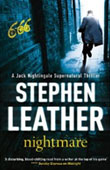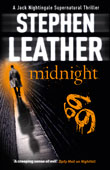Fair Game - Stephen Leather


Kidnapping is one of the cruellest crimes – lives are put at risk for cold, hard cash. But when Somali pirates seize the crew of a yacht off the coast of Africa, they bite off more than they can chew. One of the hostages has friends in high places and Spider Shepherd is put on the case. He goes deep undercover in an audacious plan to bring an end to the pirate gang’s reign of terror. But as Shepherd closes in on his quarry he realises that there’s much more at stake than the lives of the hostages.
STEPHEN LEATHER WRITES
One of the biggest problems facing any writer is the simplest – finding the time to write. There are always distractions – ringing phones, chores to be done, family members to be attended to.
My Spider Shepherd thrillers are always quite long – often more than 140,000 words. Sometimes it can be a challenge to find the time to write – but I found the perfect way of writing Fair Game - I booked myself on one of the world’s largest container ships for an eighteen-day voyage from Malaysia to Southampton. It was the perfect writing environment – and when I got off the ship in Southampton I had written close to 55,000 words – an average of more than 3,000 words a day. That’s well above my average daily rate on dry land, so I was well-pleased.
I’m not suggesting that every writer book onto a freighter, but I found it a brilliant way of shutting myself away from distractions. My mobile only worked when I was close enough to shore to get a signal, and there was no internet connection. And as I was the only passenger, I was on my own for most of the time – the perfect writing environment.
I have to say that the main reason for the trip was to research what life is like aboard a huge container ship, and to experience for myself what it’s like to sail through the pirate-infested waters around the Horn of Africa. The hero of my book – undercover cop turned MI5 agent Dan “Spider” Shepherd has to go undercover on a ship that is about to be seized by pirates. It’s all part of a cunning plot to rescue the Prime Minister’s god-daughter, who has been seized by the pirate group, and to thwart a terrorist plot. I got the original idea for the story when I heard that there were 250,000 Somalis living in the UK, the biggest population of Somalis outside Somalia. And a lot of them live in West London, for reasons that become clear in the book.
Of course I knew next-to-nothing about what it’s like on a container ship, and there wasn’t much information on the internet. If I was going to describe the ship accurately I really had no choice other than to sail on one.
Freighter cruises are not for the faint-hearted, but they are becoming increasingly popular, especially among those who prefer travelling the old-fashioned way to lying on a beach or bumping shoulders with hundreds of other holidaymakers. It was surprisingly easy to book passage on a container ship, indeed I was offered a range of possibilities.
I decided on the Hydra, a 131,000 tonne leviathan with a deck the size of four football fields and a crew of 22. It carries upwards of five thousand containers and cost more than $150 million to build.
The Hydra has four cabins for the use of passengers; three good-sized doubles and the larger owner’s cabin. Mine had a comfortable double-bed, a seating area, a big wardrobe and a huge desk. I had three windows but couldn’t see more than ten feet as the view was blocked by containers. The Hydra is first and foremost a container ship and everything revolves around the cargo.
But there was a separate large recreation room, well furnished with a sofa and easy chairs, a television and DVD player and a music centre. There was also a stack of board games but as I was the sole passenger they weren’t much use in passing the time. That was where I spent most of the eighteen days. I would get up and have breakfast at seven am with the officers, mainly Croatians. Then I would go to the recreation room and write 1,000 words before having lunch. Then it was back to the recreation room for another 1,000 words, followed by an hour in the gym. Then it was the evening meal including a couple of glasses of red wine and then back to the recreation room for another 1,000 words. For the first time in years I was able to write without the distraction of a ringing phone or the temptation to drop by Facebook or check my email.
The food was pretty much what you’d expect a Filipina cook to be cooking for Croatian officers. I didn’t have a bad meal while I was on board, but I wasn’t served anything that would have Gordon Ramsay looking over his shoulder. But then I wasn’t there for the food – I was there to research the book and to write.
So far as entertainment goes, there isn’t much to do on a freighter. At sea there’s no TV signal and no internet, so you’re advised to take plenty of DVDs and books with you. When I wasn’t writing, I polished off Stephen King’s new novel – Under The Dome – which at over a thousand pages would be a challenging read at home but at sea lasted me only a few days. But for me, it was perfect. Once the captain and crew knew that I was a writer and that I was writing a book about Somali pirates, they couldn’t have been more helpful. I was allowed the full run of the ship and spent hours under the decks, walking between the containers, and down in the engine room. The crew showed me what they were trained to do in the event of encountering pirates and how Spider could move around the ship without being spotted. The captain even came up with the perfect way of disabling the vessel so that pirates could board.
I came away with memories that will stay with me for ever. Standing with the captain of the bridge while he pointed out Venus and Jupiter in the night sky, the swathe of the Milky Way above us, and listening to him explain how a sextant works. Sailing through the Suez Canal, the giant vessel dwarfing the blocks of apartments that we passed. Passing two convoys in the Gulf Of Aden, more than forty ships of all shapes and sizes being protected against Somali pirate attacks by Japanese and Chinese warships. And being on the bridge as the port pilot guided us into Southampton.
I stood at the bow and watched dolphins playing, I spent hours on the bridge just watching the sea and the other ships and talking to the officers, and after the first week almost felt as if I was one of the crew. In fact passing through the Suez Canal one of the Egyptian pilots mistook me for an officer and asked me for the traditional ‘gift’ of a couple of cartons of Marlboro.
It has to be said that freighter trips aren’t for everybody. There are no doctors on board so you have to be healthy and need to provide a doctor’s certificate saying that you are fit enough to travel. But if you enjoy travelling and if you enjoy sailing, then there is no experience to match a voyage on a freighter. And if you’re a writer, you couldn’t ask for a better environment in which to work on your book. I’m seriously considering booking myself on a round-the-world trip and seeing if I can write an entire book during the voyage.








